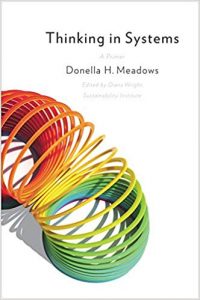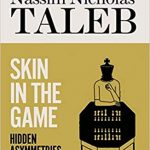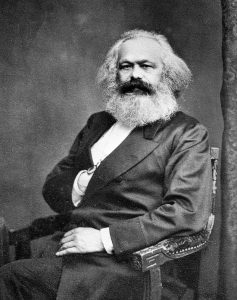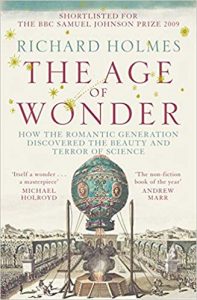A new review of ‘Thinking in Systems’ by Donella Meadows (reviewed by Robert M. Ellis) is now available on this page. This is a highly recommended book that can help you understand systems theory in a clear, universal form.
Meadows (reviewed by Robert M. Ellis) is now available on this page. This is a highly recommended book that can help you understand systems theory in a clear, universal form.
All posts by Robert M Ellis
New Review of ‘Skin in the Game’
A new review by Robert M. Ellis of ‘Skin in the Game’ by Nassim Nicholas Taleb is now published on this page.
The New Class Struggle
In recent weeks I have been hacking my way through piles of exam papers, particularly featuring a question about Marx. Although this activity generally requires the suppression of all creative impulses in favour of total concentration, I still haven’t managed to stop myself engaging in some reflections about the relevance or otherwise of Marx’s beliefs about class struggle today, and how it all relates to the Middle Way. Now that I’ve finished the marking, I’m finally at sufficient liberty to write down my thoughts.
In ‘The Communist Manifesto’, Marx and Engels famously described the whole of human history as a history of class struggle. In one way or another, they say, the propertied classes have constantly found new ways of exploiting the unpropertied proletariat, in differing circumstances from ancient slavery to the factory floor. However, they go on, capitalism creates such extreme exploitation that eventually the workers “will have nothing to lose but their chains”. Purified by their total exploitation, they will overthrow the bourgeoisie in a revolution, which will usher in a merely temporary dictatorship of the proletariat, followed by the ultimate stability of the communist society.
The elements of dogma in this story are not too hard to identify. The socio-economic determinism is one: Marx’s ‘inevitable’ story shows no signs of turning out quite like that. The purification of the proletariat through suffering is also a projection that seems to have no basis in psychological, let alone historical, conditions. Far from gaining the ultimate wisdom to finally end social and political conflict, people who are suffering acutely tend to get more stressed and more reactive. It’s only if you are very well prepared for your suffering that you might be able to learn from it, but even then it’s unlikely to bring you to an absolute state of moral perfection.
Nevertheless, the power in Marx’s story, fuelling several revolutions, also suggests to me that there must be some insights in it, mixed in with the dogmas. The story that history is a matter of class struggle does seem potent, because it is indeed quite possible to analyse history in that way. More profoundly, though, class struggles are also struggles within individuals, who identify with different sets of beliefs that may either prioritise narrow economic interests or wider values. Those conflicting values also defy resolution because they are framed in absolute terms. When you feel that you have to choose between your job and your conscience, for instance, that is ‘class struggle’ in a the wider sense, whether you are a nineteenth century mill worker or a modern Conservative Member of Parliament. You can focus on class struggle sociologically and ignore the psychology (as Marx did), or you can focus on resolving the psychology of the personal struggle and ignore its political dimension (as in the recent phenomenon of ‘McMindfulness’), but the phenomena you are dealing will have all these dimensions, and the tendency to ignore some of them is an unfortunate result of over-specialisation.
Property can provide powerful vested interests, but vested interest is not the only human motivation, so I cannot agree with Marx’s assumption that the story of class conflict is only about the division between those who have property and those who do not. Instead, it seems to me more powerfully to be between those who absolutise narrow motives (including, but not limited to, property interests) and those who, whilst remaining human and having interests, are capable of thinking provisionally about them and weighing up different values. Ironically enough, those who are capable of doing this quite often have a modest amount of property, which has given them enough security to be able to start thinking provisionally. Those who have no property at all are often (but not always) so insecure that it’s difficult for them to avoid thinking in absolute ways that are constantly fuelled by craving and anxiety. No, the proletariat are not purified by their suffering. Rather their suffering makes them easier for unscrupulous absolutists to exploit.
So what is the class struggle today? Well, we are in the midst of it. The US and the UK particularly are currently wracked by political conflict that seems to have a strong class basis. That political conflict involves ongoing polarised disagreement about climate change, about nationalism, about social justice, about the rights of minorities, and about the role of the state, along with many other associated issues. It’s not a conflict between the property-owning bourgeoisie and the propertyless proletariat though. Rather it’s primarily a conflict between, on the one hand, a cabal of autocrats and billionaires with their numerous stooges, and on the other, middle class intellectuals. Not all members of any particular socio-economic group are necessarily on one side or the other – there are still middle class intellectual climate change denialists, working class internationalists, and billionaire liberals. Nevertheless, the conflicts have a strong class dimension as well as a psychological and philosophical dimension. It would be surprising if they didn’t, given how important social class is to our identity.
The ‘middle class intellectual’ class has not been merely created by material conditions and accompanying vested interests, as Marx would tell us. Rather, they have come to appreciate conditions better, and overcome some of their biases, by having their minds opened in one of a variety of possible ways. University education and professional training provide the most common vectors for it (as shown in Robert Kegan’s work on the contexts for what he calls stage 4 and 5 adult psychological development). Travel, friendship, study, art, and religious experience all provide other possible routes to bigger perspectives that may help to inoculate you against becoming a stooge.
The new propertied exploiters, on the other hand, are defined either by their narrow focus on power and economic advantage, or by other dominant absolute beliefs that facilitate that exploitation (such as religious fundamentalism). The majority of their supporters, though, are subject to what Marx called ‘false consciousness’: that is, they have been influenced into a set of beliefs that are against their own long-term best interests. The sources of false consciousness now come overwhelmingly from media manipulation that can apparently be traced back to autocrats and billionaires, from Fox News to the Daily Mail to Russian troll factories. This media bias chart provides a useful reference of the sources of such manipulation (which are found on left as well as right, but are overwhelmingly weighted towards the right). The strong links between climate change denial, the fossil fuel industry, and right wing politics are also confirmed by a number of academic studies.
In Marx’s analysis, intractable class conflict can come to an end only through violent revolution that breaks the mould of the system. Unfortunately this seems to be another of his delusions, if the evidence of actual revolutions is anything to go by. A revolution may change those in power, but it is unlikely to change the systemic patterns of interaction, which are likely to reassert themselves to a greater or lesser degree (as they did in the Soviet Union). The stakes in our new class conflict, though, are far higher than just the exploitation of one class. The very survival of human civilisation is at stake. The conflict may end in the ‘revolution’ of the destruction of all, or it may be gradually ameliorated through changes in the ways that we respond to conditions. Either way, though, the middle-class intellectuals will evidently prevail in the long-run, just as Marx predicted that the proletariat would prevail, either by being proved right or by running the world their way. That’s not because they’ve been purified or because their perspective is perfect, but rather because they imperfectly recognise that their perspective is imperfect when their opponents do not.
Is this another story as incredible as Marx’s? I think it identifies some of Marx’s insights (class conflict, its intractability, its relationship to ideology, its asymmetry, and the nature of false consciousness) whilst also drawing attention to his dogmas (determinism, absolutisation of vested interest, purification of suffering) and limitations (ignorance of psychology, ignorance of ecology). Marx was concerned, most basically, with how people address conditions, but the ‘science’ with which he interpreted this was heavily loaded with false assumptions. The updated story I’m offering in its place may also be based on some false assumptions, but at least it is based to some degree of recognition of the need to address such assumptions (Marx tended, instead, to say that his story was ‘science’ and everyone else’s was ‘ideology’).
I expect some of the first reactions to that alternative story to be based on false equivalence, which is a common absolutist strategy (think of Trump drawing equivalences between white supremacist demonstrators and their opponents). For an absolutist, everything is dual, and there can be no such thing as better judgement through provisionality. Their opponents are therefore always assumed to be as absolute as they are, and they will insist on reducing all complexity to that equivalence. Incremental marks of credibility (such as expertise, relative lack of vested interest, ability to observe, and corroboration) as well as every kind of evidence and every widely-used value, are ground down by absolutists into the same false equivalence. However, as Marx recognised, the class struggle is asymmetrical. One side is right and the other wrong (even if it’s not always clear who is on each side), because the wrong side is entirely blinded by its assumptions, totally immersed in confirmation bias. We are all subject to confirmation bias, but some of us are facing up to this fact and others are not.
The other objection I am expecting will be to point out a false dichotomy. “It’s not as simple as that,” you may say. “Surely there were not just two conflicting classes in Marx’s day, and there aren’t now either?” I agree. I am only trying to make sense of the idea of “class conflict” by separating out the elements that seem to demonstrably cause conflict from those that are just Marxian dogmas. However, any generalisations we make about “classes”, especially when they involve determinately dividing people up, are fraught with all kinds of complex difficulties. That’s why I only want to define the “classes” in terms of their relationships to absolutisation. Whenever you or I are dominated by absolutisation, we’re in the repressive class, as exploiters or their stooges, even if we’re middle-class intellectuals. If we cease to do so and start to judge provisionally, even if we’re in the pay of Fox News, we cease at least temporarily to be in that exploitative class. We cannot define the classes sociologically in any way that I find remotely satisfactory. The social categories I have used above can only be proxies for psychological ones, and are just ways of pointing out that the psychological conditions do have constant social implications.
Psychologically, too, absolutism is not defined by counter-absolutism, but by its own assumptions. Once again, then, we also see that the Middle Way is not a compromise. If we respond to absolutists with counter-absolutism (as some left-wing absolutists do) we become absolutists. However, if we respond critically but with confident provisionality, we are not being dogmatic. The practice of the Middle Way is provisionality, not compromise, and the confidence with which it needs to be taken up must not be automatically mistaken for dogma. The Middle Way seems to be the only practical solution to the class conflict that so much concerned Marx.
The Age of Wonder
Over-specialisation, with its attendant false dualities between different areas of thought, is in my view a major issue of our time. It even affects our widespread current inability to face up to the climate crisis, as the authority of specialised experts is such a matter of conflict wherever scientists have to communicate unpalatable findings to the wider population. Surely, I often reflect, if we had a slightly more adequate education system in which both critical thinking and general psychological awareness featured more strongly, it would be a good deal harder for opportunistic denialists to gain such a popular following, and the politics of facing up to difficulty would be at least a bit easier? There are potential future ways of healing the rift – if we have a future, that is.
From time to time, though, I find contemplating the current and likely future situation too much to bear, and take refuge in the past. The past, particularly, before all this specialisation – of the gentleman scholar and the polymathic clergyman. In no way do I want to idealise the past, but it does show us in some ways, not only that things can be done differently, but that they have been. The difference is nearly always that in the past, the things that were better only applied to a very small minority, whereas now our expectations have risen to such an extent that we expect everyone to share in any improvement. When I look (with a temptation of nostalgia) at a less specialised past I have to keep reminding myself of this. Nevertheless, the intellectual integration that some groups managed in the past can still potentially be developed by a wider population in the future.
My appreciation of a pre-specialist past has been boosted recently by reading a book by Richard Holmes (best known as a biographer of Romantic English poets), called ‘The Age of Wonder’, published in 2008. This book offers an account of a crucial phase in the development of science (focusing especially on Britain), from around 1770 to around 1830, but also highlights its constant connections with the Romantic movement. It may come as news to many that during this period all scientists, as well as other thinkers, were still known as ‘philosophers’, as they were in ancient Greece. Such great figures as Joseph Banks (botanist and anthropologist), Humphrey Davy (chemist) and William Herschel (astronomer) described themselves as ‘natural philosophers’. Herschel was also a musician and Davy a poet. Davy was a close friend of Coleridge, Southey and other poets: the arts and the sciences actually talked to each other and maintained an integrated view of the world!
has been boosted recently by reading a book by Richard Holmes (best known as a biographer of Romantic English poets), called ‘The Age of Wonder’, published in 2008. This book offers an account of a crucial phase in the development of science (focusing especially on Britain), from around 1770 to around 1830, but also highlights its constant connections with the Romantic movement. It may come as news to many that during this period all scientists, as well as other thinkers, were still known as ‘philosophers’, as they were in ancient Greece. Such great figures as Joseph Banks (botanist and anthropologist), Humphrey Davy (chemist) and William Herschel (astronomer) described themselves as ‘natural philosophers’. Herschel was also a musician and Davy a poet. Davy was a close friend of Coleridge, Southey and other poets: the arts and the sciences actually talked to each other and maintained an integrated view of the world!
The theme of wonder, that gives the title to the book, is an important one. Poets and scientists were united by wonder, and wonder is an open emotion implying a strong continuing access to experiential right hemisphere perspectives. Though of course none of these figures were free of dogmatic assumptions, their sense of wonder, and their social sharing of it, could provide a check to the tendency of a specialised theoretical perspective to assume that its view of the world provides a total explanation. Not only did this make these great early scientists apparently open to new forms of discovery, but it also made them much more flexible in their use of their expertise than one would expect from a modern academic. Sir Humphrey Davy not only pioneered our understanding of the constituent gases of the atmosphere, the carbon cycle, and the isolation of substances like chlorine and iodine through electrolysis, but he also developed a safety lamp that greatly reduced the likelihood of coal miners dying in gas explosions. Today that would be considered the work of a technologist, not a scientist, but in Davy’s day there were no such distinctions.
There was wonder, too, in William Herschel’s astronomical achievements. Not only did he discover Uranus, but he was also the first to recognise the vast distances between the Earth and the stars, together with the existence of galaxies. He did this partly by developing larger and better telescopes, but also (on his own account) by just learning to look at the stars. Observation became not just a matter of passively watching, but rather a matter of actively altering your method of observation so that the visual data coming through the telescope made sense. There was wondering receptivity as well as theoretical expectation there, in a form that can add to our confidence that Herschel was not merely observing what he wanted to observe. We can never entirely rid ourselves of confirmation bias, but we can definitely make a difference.
In the hands of these inspirational early scientists, science often seems like a Middle Way practice – one in which we are constantly adjusting our view of the world in the light of new experiences and perspectives, rather than seeking only to confirm or deny. Of course, there are also many modern scientists who take this approach. There are also far more educated people in the population able to understand what they do than there were in 1830. Nevertheless, it seems to me that something important has been lost, not always in individual attitudes, but primarily in the educational and academic system that frequently isolates those individuals from each others’ perspectives. Academics can usually only compete effectively in their specialised niches by hardening their assumptions to fit the social expectations of that discipline. The relentless managerialist emphasis on ‘efficiency’ of research in modern academic life also removes much of the leisure enjoyed by those in the Age of Wonder, and so further closes the doors of wider exploration.
There are also many signs of a thirst for a return for that lost interdisciplinarity today. Recently I was intrigued to learn of the launch of the London Interdisciplinary School, due to open its doors in 2020 to an entirely interdisciplinary cohort of students. They were looking for founding faculty, so I applied, but I’ve since heard that they had 612 applications for 6 places. I thus don’t expect to be successful, but this tells you something about how much pent-up longing there is to get back, in some sense, to the age of philosophers worthy of the name (ones who are not just experts in Dismissiveness Studies).
The Age of Wonder is after all still going on, and will continue as long as we are capable of wonder. We’ll be capable of wonder as long as we can reach out beyond our own little niches of assumption – whatever they are. As long as we’re capable of wonder, we’ll also be capable of creative discovery.
The ‘3.5% rule’, stubborn minorities and tipping points
The recent protests in the UK by Extinction Rebellion have stimulated discussion of the so called ‘3.5% rule’, that 3.5% of population need to join a protest movement for it to succeed. This is based on research by Erica Chernoweth, which is discussed in this BBC article. Chernoweth looked at a variety of protest movements, and found they tended to succeed if they reached that threshold, as we see for instance in the civil rights movement in the US in the 1960’s and quite recently in the overthrow of Omar al-Bashir in Sudan.
How can a whole society be changed by such a relatively small proportion of people? It all depends how determined they are – but if they have taken to the streets, even willing to face arrest or potential violence, they are obviously resolved. This research seems to offer an example of a much wider property of systems, whereby it only takes a relatively small but unyielding element of a system to force a modification in the way the whole system operates. I have come across this same point discussed from different standpoints in two other places: Nassim Nicholas Taleb’s book Skin in the Game (2018) and Malcolm Gladwell’s book The Tipping Point (2000).
Taleb talks about the power of stubborn minorities, giving the example of orthodox Jews who want food labelled kosher obliging US food manufacturers to include it on their label. The proportion of orthodox Jews in the US is, according to Taleb, only 0.3%, but nevertheless, because this 0.3% were very definite and uncompromising about what they wanted, and because it did not require any great sacrifice on a food manufacturer’s part to label kosher food as such, they did so. So you may not need anything like as much as 3.5% if not too much is demanded of everyone else.
Taleb’s other example is the gradual replacement of Muslims for Coptic Christians in the population of Egypt. The Copts are now a minority of about 10% of the Egyptian population, but after the Muslim takeover in the eighth century they were the great majority. The Muslims were tolerant and did not force anyone to convert. What made the difference, however, is that Muslims refused to contract marriage with anyone who did not convert to Islam. All it took was that degree of unyieldingness, over many centuries of just a trickle of mixed marriages, for the Coptic majority to become a minority.
Malcolm Gladwell’s book The Tipping Point approaches the same phenomenon from the standpoint, not of minority resistance, but of minority enthusiasm. He offers story after story of new products or ideas that suddenly ‘took off’: hush puppies, Blue’s Clues, The Secrets of the Ya-Ya Sisterhood. The apparent causes of them doing so are not consistent, but in every case a kind of group epidemic occurred: the product suddenly ‘went viral’ after passing a ‘tipping point’. The sales chart started rising, not arithmetically, but exponentially. It’s clear that there are lots of reinforcing (or closed) feedback loops going on that are leading more and more people to adopt the product, because it has become a mark of acceptance by the group to do so.
What does all this have to do with the Middle Way? Well, it seems likely to me that what is often, though not always, going on, when people reach a tipping point of this kind, is absolutisation. People get into feedback loops in which the desire for the new thing (or rejection of the old thing) is driven by obsessive desire for social acceptance (or fear of losing it), and such feedback loops have the effect of producing sudden exponential change. That change is easy for even a very small group to achieve when the sacrifices demanded are small and the resistance is low (as in labelling kosher food), and require the magic 3.5% when there is some resistance, but the majority resistors are still much less strongly motivated than the minority.
But do minorities always only get what they want through absolutisation? I suggested that absolutisation may often be the source of the unyieldingness, but not always. Instead, it must be possible to be unyielding for far more justifiable and considered reasons – that one is confident of one’s cause, that it is supported by good evidence, and that it is far better justified than any alternative view. This, I hope, is what we are seeing with the campaigns of Extinction Rebellion. All the evidence I have seen so far suggests that they are very careful to try to combine a sense of urgency with calm. We need to ‘panic’ in the sense of acting urgently in response to the climate emergency, but not to ‘panic’ in the sense of locking ourselves into closed feedback loops of obsession or anxiety. This suggests that a tipping point can be reached, on a genuinely important issue, by following the Middle Way rather than any absolutized belief.
However, we also need to beware of the same phenomenon being utilised by absolutists, whether it is to advertise a product, spread a conspiracy theory through social media, or get people to accept a simple idea (like Brexit) that is grasped at as a false solution to complex problems. It takes a lot of effort and difficulty to reach a tipping point without absolutisation – but to do it with absolutisation seems so much easier! Fast thinking and easy solutions are always appealing, but there is no alternative to the harder road to the tipping point if you want to make the world a better place.
Picture by Michal Parzuchowski (Unsplash)

